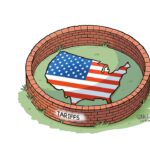Washington on Friday ended tariff exemptions for small packages and low-value items from the Chinese mainland and Hong Kong sent to the US. A Chinese expert on Saturday said that the move violates WTO’s most-favored-nation principle, while US consumers and businesses will bear the rising costs.
The exemption of tariffs for small-value shipments is an internationally recognized practice adopted by many countries. It not only provides foreign exporters with greater market opportunities but also significantly reduces costs for domestic importers. Both manufacturing industries reliant on these small-value, tax-exempt goods and consumers have benefited substantially from such policies, said Zhou Mi, a senior research fellow at the Chinese Academy of International Trade and Economic Cooperation.
The US action represents a clear deviation from multilateral trade rules. This move will severely disrupt global trade and adversely affect supply chains, Zhou told the Global Times on Saturday.
The policy has caused significant concern among US consumers and business owners, triggering a chain reaction.
Bloomberg reported that ending the “de minimis” exception is expected to have wide-ranging effects on American consumers who have increasingly purchased inexpensive clothing, household goods and other products from discount Chinese marketplaces such as Temu and Shein. It could also deal a heavy blow to independent online sellers who rely on Chinese imports.
Temu has halted all shipments into the US from China. Currently, the company is only selling products that are stocked in American warehouses, and it is actively recruiting US merchants to supply its products, the Daily Mail reported.
Shein has raised prices on products, from dresses to kitchenware, ahead of the new tariffs. As of Friday, the average price for the top 100 products in the beauty and health category increased by 51 percent, with several of the items more than doubling in price, per the Bloomberg report.
Approximately 1.36 billion shipments using the provision entered the US in fiscal year 2024, up from 637 million four years earlier, with a large number of goods from Temu and Shein, the Wall Street Journal reported on Friday, citing US Customs and Border Protection data.
As [tariffs] are calculated based on rules of origin, even companies that import products made in China to other countries before re-exporting them to the US will still be affected, according to Zhou. This impact extends beyond the products themselves and will also affect employment in companies outside both China and the US.
Oh Polly, a British clothing retailer, has raised prices in the US by 20 percent compared to its other markets, and may have to consider further price increases because of the higher tariffs, said managing director Mike Branney, Reuters reported on Friday.
“I can’t afford to buy from Temu now, and I already couldn’t afford to buy in this country,” Rena Scott, a 64-year-old retired nurse from Virginia, was quoted in a CNN report.
About 48 percent of de minimis packages shipped to the poorest zip codes in the US, while 22 percent were delivered to the richest ones, according to a February research from UCLA and Yale economists, per the CNN report on Friday.
Zhou noted that the additional costs resulting from the end of tariff exemptions will inevitably ripple through the supply chain, requiring negotiations among upstream and downstream stakeholders to determine cost-sharing mechanisms. If e-commerce platforms restructure their supply chains – such as shifting imports to other countries – this will challenge the reestablishment of trust and cooperative relationships within global supply networks, he added.
Some retailers have also stopped selling to US customers. “We’re going from zero to 145 percent, which is really untenable for companies and untenable for customers,” said Cindy Allen, CEO of Trade Force Multiplier, a global trade consultancy. “I’ve seen a lot of small to medium-sized businesses just choose to exit the market altogether,” she said, according to the Reuters report. The report also noted that some merchants from the UK and Canada have paused shipments to the US.
The policy has also caused rising costs for logistics. Goods from the Chinese mainland and Hong Kong shipped via UPS, DHL and FedEx are subject to a baseline 145 percent tariff, plus any additional product-specific tariffs. Goods shipped through USPS will be subject to a baseline 120 percent tariff or a flat $100 fee per postal item. The flat fee will increase to $200 starting June 1, CNN reported.
In April, Chinese Ministry of Commerce spokesperson He Yongqian slammed the US tariff adjustment on low-value packages as “disruptive,” noting that the move will “severely impact the interests of American consumers.” He stressed that cross-border e-commerce offers unique advantages like high efficiency, fast delivery and low costs.
“Policy adjustments in this area should aim for facilitation,” the spokesperson said, adding that China is ready to work with other countries to enhance exchanges and cooperation, and jointly promote the sound and sustainable development of cross-border e-commerce.
In response to a question asking whether China’s Ministry of Commerce (MOFCOM) has any further information and comments as the US has repeatedly said that it is negotiating with the Chinese side on economic and trade issues and will reach an agreement, a spokesperson from the MOFCOM said on Friday that China has taken note of the repeated statements made by the US side at a high level that it is willing to negotiate with China on the issue of tariffs. At the same time, the US has recently taken the initiative to convey information to the Chinese side on a number of occasions through relevant parties, hoping to talk with the Chinese side. In this regard, the Chinese side is making an assessment, the spokesperson said.
Global Times













